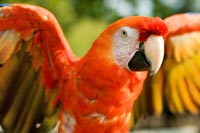
The quality of the accommodation you extend to your pet parrot is so important because it will ultimately define its quality of life. Whether it will end up a happy, healthy, lively bird or an unhealthy, unhappy self-destructive pet is actually dependent on you and on the manner by which you set up its living quarters.
There are some things you need to know about the parrot before you decide to buy one as a pet.
First of all, a parrot is a highly intelligent animal that has the intelligence of a two or three-year-old human child. As such, it needs to be entertained and stimulated mentally to avoid it getting bored and feeling neglected which can lead to self-destructive behavior.
Secondly, it is a flock bird, meaning, its used to being among other birds. Thus, it needs daily and, if possible, large doses of socialization with you and other members of the family to keep it happy and content.
And finally, it is a wild bird used to flying from tree to tree foraging for food, finding water, preening, building nests, and doing many other things that keep it busy and alert. In captivity, therefore, your parrot needs to remain active and have access to elements that will keep it mentally alert or else it may get depressed and become troublesome.
These are just some inherent traits of your parrot that you need to consider when you set up its living quarters. To make sure you have all the important areas covered, parrot behavior experts have come up with some points you need to keep in mind when preparing your pet parrots accommodation.
•Get the biggest cage you can get for your pet parrot to give it room to fly. At the very minimum, the cage should measure double its full wingspan in floor area and double its length from its head to the tip of its tail in height.
•Make sure its cage is situated in a safe place with enough ventilation and sunlight but never put it directly under the sun as this can dehydrate it and kill it. Put your bird in a part of the room where there is a lot of human activity so it gets to feel like it is part of the family.
•Make sure your parrot gets at least 10 hours of quiet sleep at night and a lot of exercise during the day. Put a variety of perches in its cage where it can sit and exercise its feet. Whenever possible, take your bird out of the cage and take it around with you so it remains active and alert.
•Keep your parrots living environment clean at all times to prevent bacteria from developing from dried up fecal matter. In order to keep your bird healthy and alert, make sure it gets fresh water and food everyday and its cage kept pristine at all times. Do not situate your parrot in places where it can inhale fumes or cigarette smoke as this can make it sick and die.
•Keep your pet parrot alert and interested by providing it with safe toys to play with. Remember, your bird has the intelligence of a small human child so rotate its toys periodically to keep it interested. If you can find toys that make your bird solve a puzzle (i.e., toys wherein you can hide a seed and your parrot has to figure out how to get it), it would be so beneficial for it as it would keep the animal pre-occupied and less lonely for your company.
Before deciding to buy a pet parrot, first ask yourself if you are ready to make a commitment to it and give it all the attention it needs to keep it a happy and healthy bird, both physically and mentally. If you know you wont have time to take it out of its cage every now and then to socialize and spend some quality time with it, then dont buy a parrot. Let someone else with more time take care of one. For parrots, no matter what species it may belong to, neglect is a form of punishment much too cruel to bear. So love your pet and watch how it responds lovingly to you. Despite all the trouble you have to go through to maintain your pet, to see and feel it responding to you can be so infinitely gratifying!